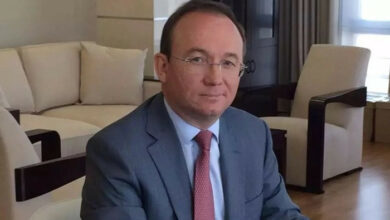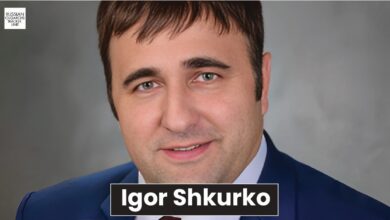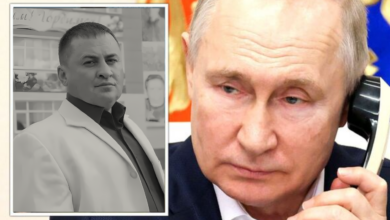Ex-Russian Ministry of Interior Major General Vladimir Makarov age 72, Takes His Own Life
A former Russian police general who previously held the position responsible for suppressing protests has been discovered deceased, apparently by suicide, after being relieved of his duties by President Vladimir Putin.
In a shocking turn of events, a former high-ranking Russian police general, ex-Russian Ministry of Interior Major General Vladimir Makarov, who once held a pivotal role in quelling protests, has reportedly taken his own life. The tragic incident unfolded shortly after President Vladimir Putin removed him from his influential post. This narrative delves into the life and career of Vladimir Makarov, shedding light on his role in suppressing opposition activists and the circumstances surrounding his sudden exit from the corridors of power.
The individual in question, Ex-Russian Interior Ministry Major General Vladimir Makarov, aged 72, had played a significant role in supervising Russia’s efforts to suppress opposition activists during his tenure as the deputy chief of the Russian police’s anti-extremism
Who was Major General Vladimir Makarov?

In a shocking turn of events, a former high-ranking Russian police general, ex-Russian Ministry of Interior Major General Vladimir Makarov, who once held a pivotal role in quelling protests, has reportedly taken his own life. The tragic incident unfolded shortly after President Vladimir Putin removed him from his influential post. This narrative delves into the life and career of Vladimir Makarov, shedding light on his role in suppressing opposition activists and the circumstances surrounding his sudden exit from the corridors of power.
Vladimir Makarov, a prominent figure in the Russian law enforcement apparatus, began his journey in 1951 when he was born into a modest family. His early years were characterized by commitment and diligence, which eventually led him to join the Russian Interior Ministry. Over the years, Makarov steadily climbed the ladder of success, distinguishing himself as a capable and ruthless officer.
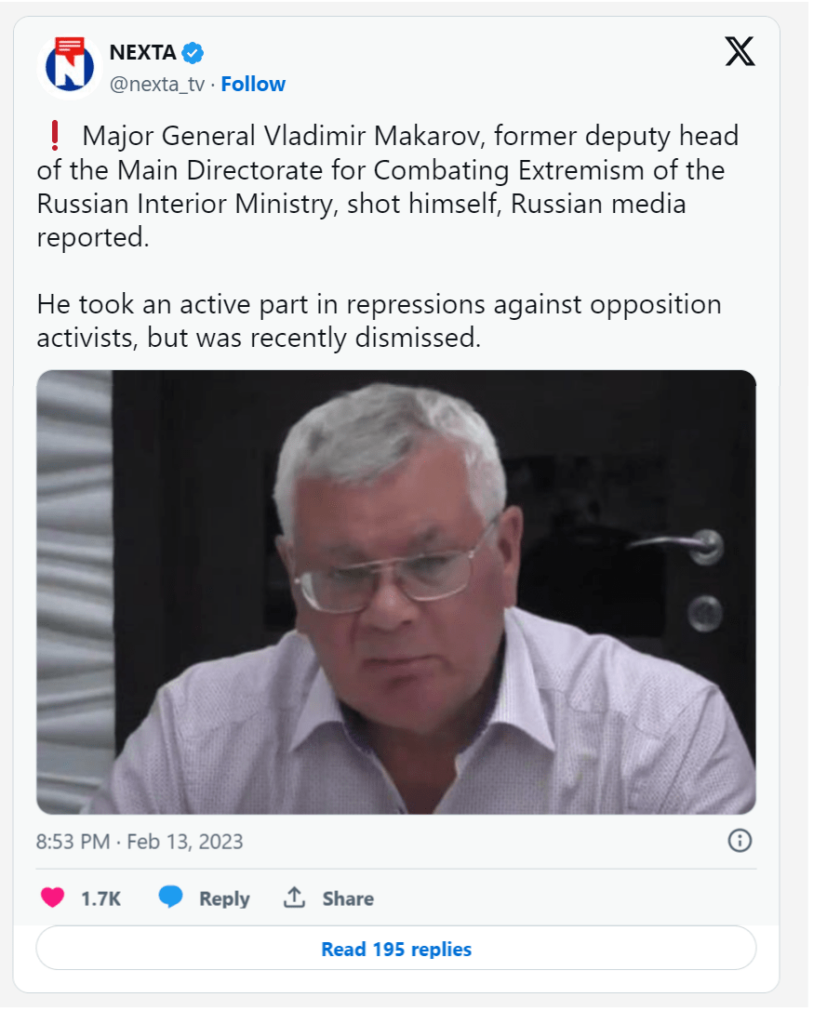
Makarov’s Career Trajectory
One of the defining chapters of ex-Russian Ministry of Interior Major General Vladimir Makarov’s career was his tenure as the deputy chief of the Russian police’s anti-extremism division. This role placed him at the forefront of efforts to suppress opposition activists, making him a central figure in the Kremlin’s strategy to maintain control over the political landscape. Under Makarov’s leadership, the anti-extremism division carried out numerous operations targeting activists and journalists whom the Kremlin deemed problematic.
The Suppression of Opposition Activists
Makarov’s influence within the anti-extremism division was characterized by an unyielding commitment to the Kremlin’s agenda. He oversaw a range of operations aimed at quashing dissent and suppressing voices critical of the government. These operations often involved the arrest, harassment, and intimidation of opposition figures, leading to a climate of fear and repression.
Makarov’s pivotal role in these operations earned him both admiration and condemnation. Supporters of the Kremlin viewed him as a stalwart defender of Russia’s stability, while critics saw him as an emblem of authoritarianism and brutality. His actions, however, could not be divorced from the broader context of Russia’s political landscape, where the government’s grip on power was tightening.
The abrupt end of Ex-Russian Ministry of Interior Major General Vladimir Makarov’s career came in late January when President Vladimir Putin decided to remove him from his post. The reasons behind this decision remain shrouded in mystery, with no official statement providing a clear explanation for Makarov’s dismissal. Some speculated that it was part of a broader shakeup within the Russian law enforcement apparatus, while others believed it might be linked to internal power struggles or international pressure.
The impact of Makarov’s removal from his influential role was felt across the spectrum of Russian politics. For opposition activists, it represented a glimmer of hope, as the departure of a key figure responsible for their suppression hinted at potential changes in the government’s approach to dissent. Meanwhile, supporters of Makarov lamented the loss of a trusted defender of the status quo.
Tragically, a shocking event that shocked Russia and beyond followed ex-Russian Ministry of Interior Major General Vladimir Makarov’s departure from power. Just days after his dismissal, news broke that Makarov had taken his own life. The circumstances surrounding his death remain clouded in uncertainty, fueling speculation and conspiracy theories.
The news of Makarov’s suicide left many grappling with questions. Did the loss of his powerful position push him to despair? Were there unseen factors in his personal life that contributed to his tragic decision? Or were there darker forces at play, seeking to silence a man who knew too much?
Legacy and Controversy
The life and career of Vladimir Makarov are emblematic of the complexities and contradictions within Russia’s political landscape. His legacy is a polarising one, with some viewing him as a guardian of stability and others as an enforcer of repression. His abrupt departure and subsequent suicide only added to the enigma surrounding his persona.
Makarov’s story also highlights the precarious nature of power in modern Russia. In a system where loyalty to the Kremlin is paramount, even the most influential figures can find themselves on the wrong side of political winds. The circumstances of his removal and the mystery of his death serve as a stark reminder of the ruthlessness and unpredictability of Russian politics.
The individual in question is ex-Russian Interior Ministry Major General Vladimir Makarov, who was 72 years old at the time of his death. During his tenure as the deputy chief of the Russian police’s anti-extremism division, Makarov played a prominent role in overseeing efforts to suppress opposition activists. President Putin terminated Makarov’s employment in late January, putting an end to his significant role in planning operations against activists and journalists whom the Kremlin deemed problematic.
Career
Makarov is said to have held positions in various financial institutions in Moscow at the start of his professional journey. He began working at the Academy of Economic Security before moving on to the Department for Combating Organized Crime within the Ministry of Internal Affairs. Later on, he made another move, this time to the anti-extremism organization referred to as the Centre “E.” Makarov was known for his past role as the primary orchestrator of operations against opposition activists and journalists deemed troublesome.
How did the Ex-Russian Ministry of Interior Major General Vladimir Makarov commit suicide?
At 7 a.m., Valentina, Makarov’s wife, awoke to the sound of a gunshot at their rural home in the Golikovo village, close to Moscow. In response, she immediately contacted a family member and called for an ambulance. Despite the efforts of the paramedics, Makarov could not be revived, and he was declared deceased.
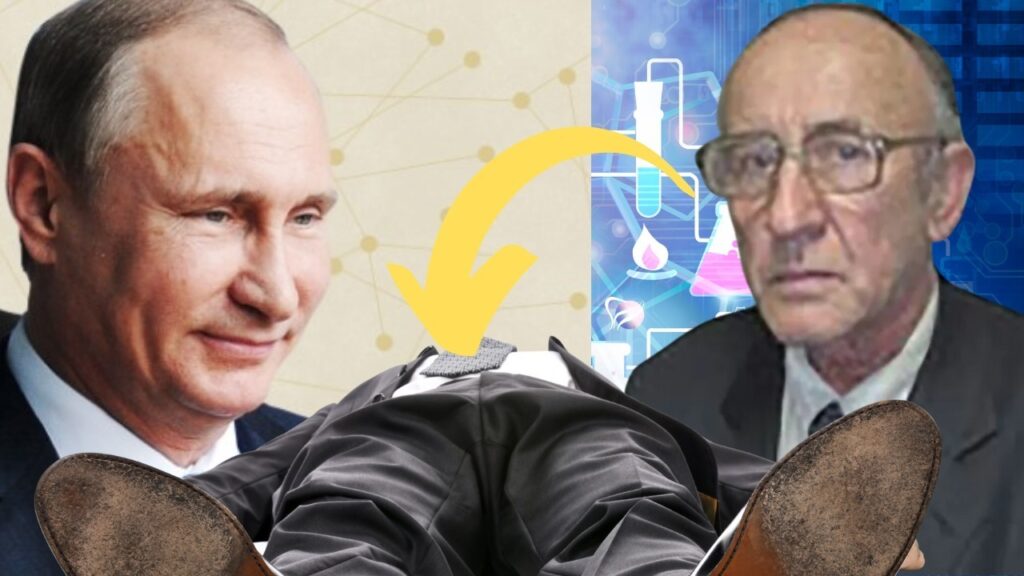
According to his family members, Makarov had fallen into a deep depression following his unexpected termination last month and was unsure about the future of his career after dedicating his life to military service.
Other mysterious Russian deaths or attacks surrounding Putin
Boris Nemtsov
In 2015, Boris Nemtsov, a prominent Russian opposition figure known for his strong criticism of the Putin administration, was fatally shot in an assault that took place on a bridge within sight of the Kremlin.
- He met his demise just a few days prior to his scheduled leadership of an uncommon public demonstration against Russia’s takeover of Ukraine’s Crimean area and its backing of separatist activities in eastern Ukraine’s Donbas region.
- The Kremlin disavowed any participation, while in 2017, a Russian court found five individuals guilty of Nemtsov’s murder in a trial that his family labeled as an attempt to conceal the truth.
- In the years that followed, it came to light that a government agent working with a group that carried out assassinations had been closely watching him in the months before his death.
Alexei Navalny
The leader of the opposition, Navalny, who is currently incarcerated for approximately three decades, was poisoned in August 2020 using a potent nerve agent known as Novichok, a product of Soviet Union’s research and development.
- The Kremlin claimed no responsibility, but later inquiries conducted by Bellingcat revealed that the individuals behind the assault were affiliated with Russia’s Federal Security Service (FSB) and that the decision to poison him had come from the highest levels of the Kremlin.
Alexander Litvinenko:
In 2006, Litvinenko, a former KGB agent turned whistleblower, passed away in the United Kingdom as a result of poisoning with a scarce and extremely radioactive substance known as polonium-210.
- Once more, Russia has refused any participation, yet both the United Kingdom and the European Court of Human Rights have reached the determination that Russia likely played a role. The UK investigation even went as far as suggesting that Putin “likely sanctioned” the assassination of Litvinenko.
- One of the indications suggesting the Kremlin’s participation is the observation that nearly all the global supply of polonium-210 originates from state-managed nuclear facilities in Russia, where nuclear authorities have emphasized strict oversight over access to this element.
Sergei Skripal:
In 2018, Skripal, a former Russian intelligence operative residing in the United Kingdom, along with his daughter, fell victim to an assault in Salisbury. They were targeted with a nerve agent that bore a resemblance to the substance employed in the attack against Navalny.
- Skripal and his daughter managed to survive, but a British citizen lost their life, and several others were harmed when they encountered a perfume container suspected to be linked to the incident.
- The United States, the United Kingdom, and several other countries have jointly determined that individuals affiliated with the Russian military intelligence agency were responsible for the poisonings. Furthermore, the United Kingdom has formally accused three members of this agency in connection with the incidents.
Yuri Shchekochikhin:
In July 2003, Russian investigative journalist and liberal lawmaker Shchekochikhin experienced a sudden illness and passed away. Doctors at a hospital associated with the Kremlin stated at the time that his cause of death was attributed to a severe allergic reaction.
- His family members have reported that Shchekochikhin endured a harrowing 12-day period characterized by excruciating pain, during which his skin progressively peeled off, his hair fell out, and his organs suffered successive failures.
- When they requested access to Shchekochikhin’s medical records, medical professionals informed his family that these documents were being held by prosecutors, citing them as a “medical secret.” This was in relation to an investigation that would not be initiated until several years later.
- In the years leading up to his demise, Shchekochikhin had published investigative reports exposing a smuggling operation, money laundering activities, and a corruption scandal involving high-ranking FSB (Federal Security Service) agents.
- Additionally, he had been delving into the potential involvement of the FSB in the 1999 Moscow apartment bombings, an event that played a part in triggering the Second Chechen War.
Anna Politkovskaya
In October 2006, Anna Politkovskaya, a Russian journalist and advocate for human rights, was fatally shot in her residence located in Moscow.
- She had documented human rights abuses during the Second Chechen War and authored a book in 2004, asserting that Putin, via the FSB, was suppressing civil liberties to steer the nation toward a Soviet-style dictatorship before she passed away.
- In 2014, a Moscow court convicted five men for her murder, but the identity of the individual who ordered her assassination was never determined.
Multiple Russian oligarchs and executives also died :
According to a report from The New York Times, a number of prominent Russian oligarchs and high-ranking executives have met untimely deaths in perplexing circumstances, including suicides and accidents, since the commencement of Russia’s invasion of Ukraine.
- Ravil Maganov, who held the position of Chairman of the Board at Lukoil, a prominent Russian conglomerate, experienced a tragic and unexpected demise in September 2022. This unfortunate incident occurred when he fell from a hospital window in Moscow. The circumstances surrounding his death garnered significant attention and controversy in Russia and beyond.
- Russian media initially reported that Ravil Maganov had taken his own life, implying that it was a case of suicide. However, in response to these reports, Lukoil released an official statement following his passing. According to the company’s statement, Maganov did not succumb to suicide but rather passed away as a result of a severe illness.
The sudden and perplexing nature of Maganov’s death, along with the contrasting narratives presented by the media and Lukoil, added an extra layer of complexity to this tragic event. It raised questions and speculation within both the business community and the public, leaving many seeking further information and clarity about the circumstances surrounding the loss of a key figure in one of Russia’s largest private corporations.





